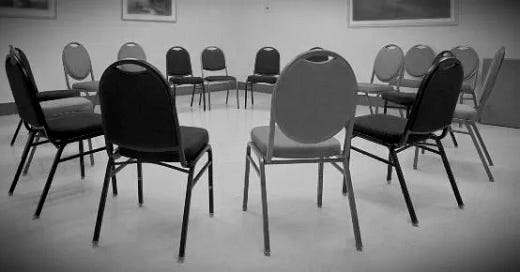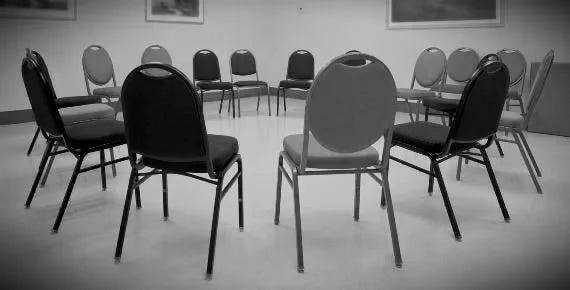For years, I believed the only path out of my troubled relationship with alcohol went through a windowless basement. You’ve probably seen it: fluorescent lights humming overhead, the faint smell of stale cigarettes, and a circle of men referring to themselves as “drunks.” That was AA for me. A room full of people committed to sobriety, but where I felt trapped instead of free.
Let me be clear: AA has helped millions of people get and stay sober. If it works for you, I’m glad you’ve found a path that resonates. This is not a critique of the program but a reflection on my own experience. I spent years trying to fit into the framework of AA, attending meetings, building relationships, and working “the Program.” Yet, sobriety through AA always felt like I was trading one obsession for another: drinking for not drinking.
The mantra of “one day at a time” never clicked for me either. It seemed less like liberation and more like a hamster wheel. Every day, I was either struggling to resist the urge to drink or convincing myself to go to yet another meeting to talk about not drinking. It wasn’t freedom—it was survival. And survival, while better than destruction, isn’t the life I wanted.
The Basement Years
For over 20 years, I was aware of my unhealthy relationship with alcohol. And for almost as long, I turned to AA to help me quit. I tried everything: Big Book meetings, newcomer meetings, speaker meetings. I forced myself to engage with people, exchanging numbers, texting outside of meetings, even leaning into my discomfort as an introvert.
Despite my efforts, sobriety through AA felt like a constant sacrifice. I wasn’t drinking, but I wasn’t happy. I lived every day with the voice in my head screaming, Drink and go to a bar. And AA’s response seemed to be, Don’t drink and go to a meeting. It didn’t feel like a solution—it felt like a stalemate.
I met men who genuinely cared about helping me stay sober. But the relationships felt forced, tethered only by our shared desire not to drink.
I met men who genuinely cared about helping me stay sober. But the relationships felt forced, tethered only by our shared desire not to drink. Texting someone just to check in and talk about not drinking felt more like reporting to a probation officer than building a connection. Instead of feeling supported, I felt suffocated.
Finding Another Way
After years of struggling within the framework of AA, I finally realized I needed a different approach. For me, sobriety couldn’t mean obsessing over not drinking. It had to mean freedom from the entire cycle of obsession.
On May 16, 2022, I made the decision to stop drinking. This time, I didn’t rely on AA. Instead, I turned to alternative methods and perspectives that fundamentally changed my relationship with alcohol.
One of the most impactful resources was This Naked Mind by Annie Grace. Her book helped me retrain my subconscious beliefs about drinking, reframing it not as something I was losing but as something I was gaining freedom from. I began to see sobriety not as a sacrifice but as a gift.
I also explored medical interventions, including the Sinclair Method. For three months before quitting, I used Naltrexone, a medication that blocks the pleasure receptors activated by alcohol. By taking the pill an hour before drinking every time, I gradually dissociated drinking from pleasure. Over time, that “reward” I used to crave simply disappeared.
This combination of tools made all the difference. For the first time, sobriety didn’t feel like a daily struggle. It felt like reclaiming my life.
Freedom Beyond Sacrifice
As of day 932, I don’t feel like I’ve given anything up. Instead, I feel like I’ve gained everything back. Sobriety has allowed me to enjoy the mundane moments that used to feel like obstacles: picking up my daughters from school, grocery shopping, or even doing the dishes. These moments are no longer in the way of drinking—they’re the moments I treasure most.
I don’t want to mislead anyone. Quitting alcohol is incredibly hard. It’s one of the hardest things I’ve ever done, and staying sober will always require effort. But for the first time, I feel like the effort is worth it. I don’t feel deprived; I feel free.
The View from the Basement
I’m not writing this to discredit AA or discourage anyone from trying it. AA has helped countless people, and it might be the right path for you. But it wasn’t for me. I write this because I know there are others out there, sitting in those windowless basements, wondering if there’s another way.
There is. Sobriety doesn’t have to feel like a sacrifice. It doesn’t have to be a daily struggle or a laser focus on “not drinking.” It can be liberating, joyful, and fulfilling. The key is finding what works for you—whether that’s AA, a medical approach, a mindset shift, or some combination of tools.
Breaking Free
After years of thinking sobriety meant obsessing over not drinking, I’ve discovered that true freedom lies in retraining your mind and embracing a lifestyle change. Sobriety is no longer something I endure one day at a time. It’s something I live.
If you’re struggling, know that it’s possible to stop drinking without feeling trapped or deprived. You can find your own way, one that feels right for you. Because the view from the basement doesn’t have to be the only view.
If Sober Founder resonates with you, hit the ♡ and subscribe—it helps others find this space and keeps the conversation going. Thank you!




